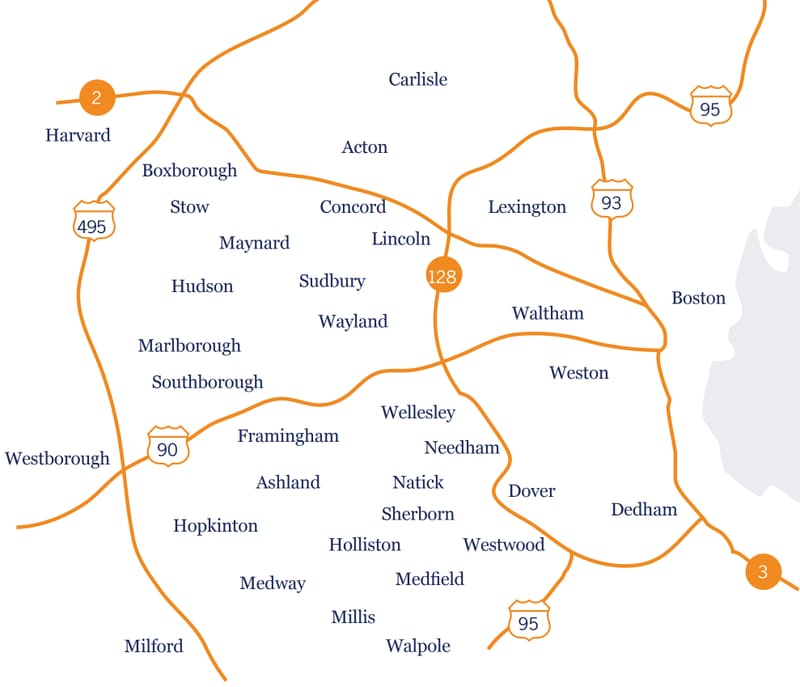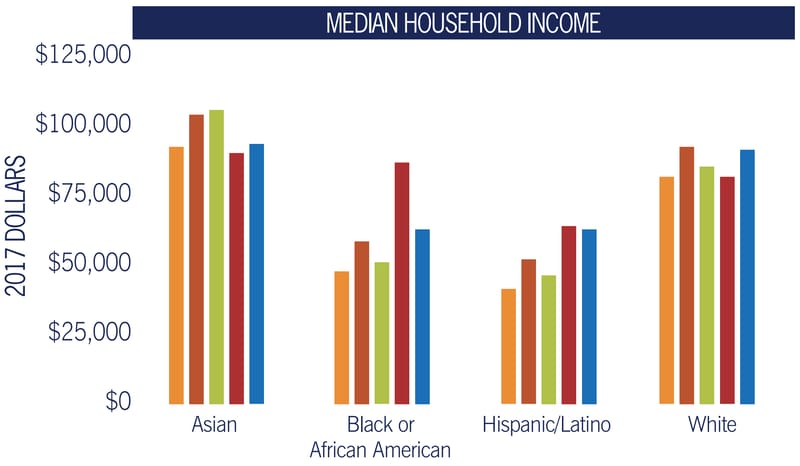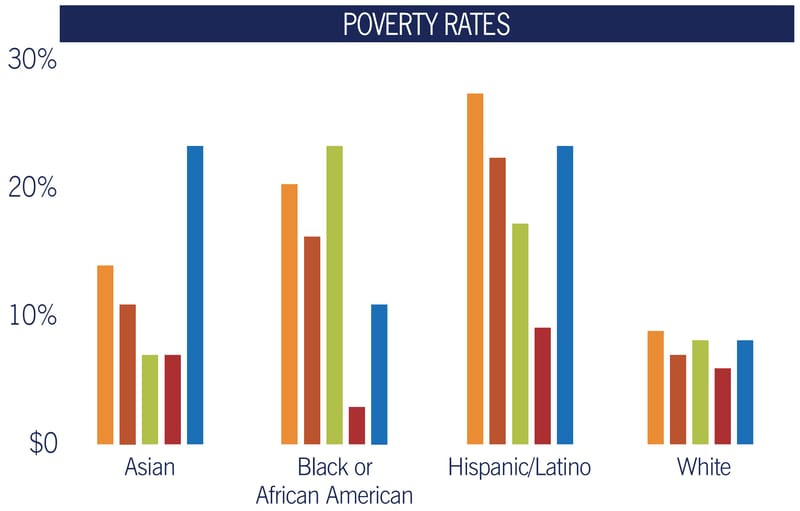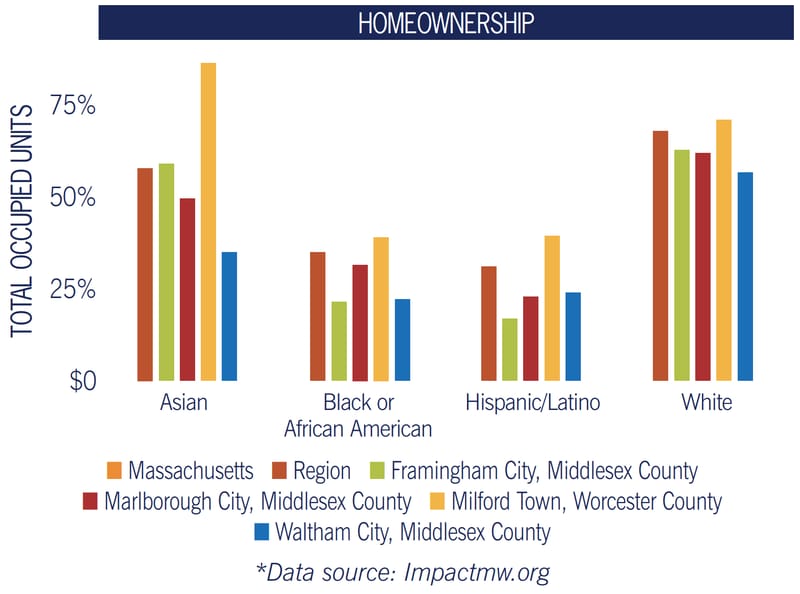Housing and Homelessness Prevention
This Action Project focuses on prevention-based models to address housing and homelessness inequities that persist in MetroWest. The goal is to provide paths to safe, stable, and permanent housing for under-resourced residents.
Housing is the key to reducing intergenerational poverty and an important factor in increasing economic mobility and addressing community safety and wellbeing. For many decades, zoning barriers, insufficient affordable housing development, and population growth have created a complex and multifaceted housing problem in the Commonwealth. As a result, we have an affordability crisis, a supply and demand imbalance, and, most critically, an increasing homelessness crisis. To put the homelessness crisis into perspective, from 2020-2023, 3,141 more people in families with children experienced homelessness in Massachusetts, more than any other state in the U.S.
In MetroWest specifically, root causes such as rising rents in our dense population hubs of Framingham, Waltham, and Milford, exponential increases in home prices in both wealth communities like Wellesley and middle-income communities like Medfield and Hopkinton, and a lack of available public transportation infrastructure in Marlborough contribute to a complex housing system that requires a multilayered solution.
To understand the complex problem more fully, Impact MetroWest data indicators show many disparities across racial and ethnic lines. Here are some key statistics related to Housing and Homelessness Prevention:
- 8% of Massachusetts residents live in poverty, but in MetroWest, the disparities fall along racial and ethnic lines.
- 14% of black residents in MetroWest live in poverty while 19% of Hispanic residents live in poverty.
- Median household income in MetroWest also sees sharp differences along racial and ethnic lines. From 2016-2020, white resident incomes averaged $100k, while black resident incomes averaged $66k and Hispanic resident incomes averaged $60k.
- An important driver of homelessness is the high cost of living in MetroWest. A family with one earning adult and two dependent children must earn $49/hour to adequately pay for food, shelter, and other basic needs.
- An important cost of living indicator is the percentage of income spent on rent where 30% is the national standard for affordability. Hispanics in MetroWest pay 35% of income on rent on average.
Successful prevention-based solutions to housing issues are well documented, but difficult or expensive to maintain and balance with the pressing and crisis-oriented needs that continue to exist. The Department of Housing and Urban Development identified several strategies including blending supportive services for individuals and families with access to permanent housing as well as a focus on mediation in Housing Courts. The Housing First philosophy which prioritizes permanent supportive housing and rapid re-housing has been a well-documented model in Massachusetts.
We believe that government solutions are essential to tackling housing and homelessness prevention, but that philanthropy must play an important part in prioritizing housing and homelessness prevention as a significant and strategic investment.
In our community, and through the new MetroWest Homelessness Prevention Action Project, we will invest in a multilayered solution that combines effective and direct strategies to prevent homelessness with coalition building and sustainable collaboration across the sector.
MetroWest Collaborative Development
To support efforts to build affordable housing, connect low-income individuals and families to available affordable housing, and advocate for more affordable housing by working directly with municipal leaders in creating solutions to affordable housing issues.
Bethany Hill Place
To support their affordable housing development in Framingham that serves 120 MetroWest residents with permanent housing and economic mobility programming and education.
One Family Inc
To support their education and coaching for economic self-sustainability with a focus on college graduation, career readiness, and financial literacy that provide the necessary wrap around support for individuals and families to remain in or access permanent housing solutions.
WATCH Inc
To support their free counseling for individuals and families in need of housing or eviction prevention services and efforts to convene a local civic engagement group called the Tenant Action Group which organizes and advocates for the rights of low-income residents in affordable housing.
MetroWest Mediation Services
To support their focus on Housing First by preventing eviction and homelessness through mediation practices between tenants and landlords for more than 300 families across MetroWest.
Family Promise MetroWest
To support their efforts to stabilize families with children experiencing homelessness at their permanent shelter in Natick with the goal of transitioning these families into permanent housing through rent subsidies and education programming.
Advocates/Behavioral Health Partners of MetroWest
To support the BHPMW’s efforts to convene a brand new housing coalition tasked with creating a better network and collaboration across all of the housing providers so that information is shared more rapidly, more clearly, and more efficiently across our region.
Data Driven & Issue Focused
This project is aligned with the mission of the Community Foundation for MetroWest. In 2019, the Foundation in partnership with Middlesex Savings Bank launched Impact MetroWest, a comprehensive community needs assessment of over 60 indicators that increases awareness around the strengths and challenges facing the 30+ communities of MetroWest.
Credible and independent data is vital to inform decisions and determine priorities, so we can collectively take action to improve the quality of life for all residents.
Based on the data and collaborative conversations, the Foundation has determined that addressing homelessness is a community priority and will concentrate efforts to move the needle on specific indicators, allowing opportunities for Foundation donors and fundholders to join the effort as investors and partners in the work.

- Children & Families
- Community Life
- Demographic & Diversity
- Economy & Workforce
- Education
- Financial Security
- Racial Equity
Key Data
By looking at median household income, poverty rates, and homeownership rates, inequality becomes clear. For example:
- Hispanic/Latino households average $52k in annual
income, compared to White households at $92k - Asian, African American, and Hispanic/Latino households
have higher rates of poverty than White households - 35% of African Americans own a home in MetroWest,
compared to White households at 68%



Inquire Now
To learn more about our Action Projects and how you can support them, contact Matt Jose, Senior Program Officer, Action Projects.
